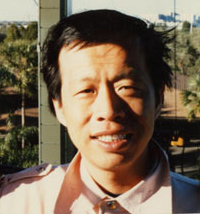Wang Xiaobo
Wang Xiaobo (Chinese: 王小波) (May 13, 1952-April 11, 1997), was a widely-acclaimed contemporary novelist in China. Regarded as the country's equivalent to Franz Kafka or James Joyce, Wang had a large number of readers who enjoyed his sarcastic tone and distinct sense of humor.
His best known works include "Golden Times," "Silver Times," "Bronze Times" and "My Spiritual Home." Moreover, his only script "East Palace, West Palace," which was adapted into the film by the same name, received the Best Screenplay Award at the Argentina International Film Festival.
Born in Beijing in 1952, Wang had a genius for writing. He was highly appreciated by his Chinese teacher in primary school and got his story broadcast in the school when he was 12. Yet his academic study was interrupted by the Cultural Revolution. In 1968, Wang, as were many of his peers, was sent to a farm in Yunnan for reclamation. The rural life inspired Wang, who later wrote the novels - "Golden Times" and "Enduring as Heaven and Earth" - based on his experience in the rustic land.
In 1973, Wang returned to Beijing and worked in factories. Four years later, he met Li Yinhe, his future wife who was an editor at the Guangming Daily. In 1978, Wang took part in the National Higher Education Entrance Examination, which had just resumed after the Cultural Revolution. He passed the exam and was enrolled at the Trade and Economy School of China's Renmin University. In1980, Wang married Li and published his first novel.
Upon his graduation in 1982, Wang received a job to teach at his Alma Mater, which enriched his writing of "To Took the Stand at Thirty," a story concerning the lives of teachers. At the same time, he started the novel "Golden Times," which took him 10 years to finish and brought him to prominence.
In 1984, he followed his wife to the University of Pittsburgh in the United States for a master"s degree in the study of East Asia. During the two years of overseas study, the couple travelled extensively throughout the United States and West Europe. Wang later published some prose about their travels.
In 1988, Wang returned to Beijing with his wife and found a job teaching sociology at the top-ranked Peking University. In 1991, his work "Golden Times" was serialized in the supplement of the United Daily News, a Chinese newspaper in Taiwan. The novel, focusing on lives during the Cultural Revolution, made a big splash and was awarded a literary prize.
In January 1992, Wang co-worked with Li to publish "Their World - A Perspective of China"s Gays." In September of the same year, Wang resigned from Peking University and became a freelancer. Three months later, he started his script "East Palace, West Palace" at the request of well-known director Zhang Yuan. In 1995, his "Future World" won another award from the United Daily News. In 1996, Wang went to the University of Cambridge, England as a visiting scholar.
The famous author died of cardiovascular disease in 1997 at age of 45.
